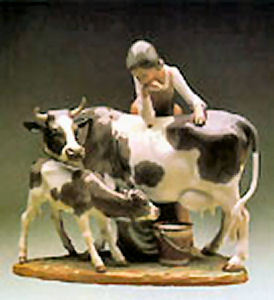
Cows have to give birth to a calf every year in order to produce milk. Mother cows are known to have highly developed maternal instincts and can bellow for days for their stolen babies! The killing of bobby calves, usually at 5 days old as unwanted by-products of the dairy industry, is one aspect that shows it is not a benign industry. We kill over one million new-born calves each year. In Australia, legal means of destroying these unviable calves on farm includes bludgeoning calf skulls with a hammer or shooting them in the head with a rifle or a mechanical bolt. Vealers are raised in crates to be anaemic, for white flesh.
The dairy industry is a high water consumer, and must take a lot of responsibility for the demise of the Murray-Darling food basin! We are also heavy exporters of dairy products. How sustainable is our dairy industry?
Methane emissions from dairy cattle contribute around 30% of all agricultural emissions that total an 18% contribution from agriculture, due mainly to livestock.
According to ABS, in 2005-06, the agricultural commodities that used the most water in the Murray Darling Basin (MDB) were dairy farming - 1,287 GL or 17% and pasture for other livestock - 1,284 GL or 17%, much of this for dairy cattle. In 2005-06, the dairy industry accounted for 39% of the total irrigated area of pasture in the MDB.
About 45% of Australian milk is exported (2007/2008), mainly as milk powders, cheese and butter.
European style diary products can be replaced by more humane and sustainable plant-based ones such as soy, rice and oat milks.
Dairy products have naturally high levels of saturated fat which raises blood cholesterol and will increase vascular disease risk in many people. The traditional cuisines of many countries are dairy-free. Australia's Western-style diseases can be attributed to the amounts of animal-saturated fats we consume, including that found in dairy products.
The amount of water used to make a litre of milk is between 320 and 1000 litres. Soymilk requires about half the amount water of dairy milk. Soymilk is high in protein without the water consumption, the environmental impact of livestock, without the deaths of calves and cruelty to cows, and is healthier!
www.rspca.org.au/campaign/dairyindustry.asp
www.dairycruelty.com.au

Comments
Bea (not verified)
Sun, 2008-12-21 23:29
Permalink
As much as milk is 'natural'
James Sinnamon
Mon, 2008-12-22 00:00
Permalink
Soy milk no good for the environment either
Vivienne (not verified)
Mon, 2008-12-22 08:48
Permalink
soy monocultures
Greg (not verified)
Wed, 2008-12-24 17:44
Permalink
The nature of natural
Vivienne (not verified)
Fri, 2009-01-09 00:58
Permalink
What is "natural" is not necessarily moral or sustainable.
quark
Sat, 2009-10-10 10:26
Permalink
It's the scale of things
ECOENGINE (not verified)
Sat, 2015-01-31 11:57
Permalink
Some dairy farmers agree with Voiceless concern about cruelty
Add comment